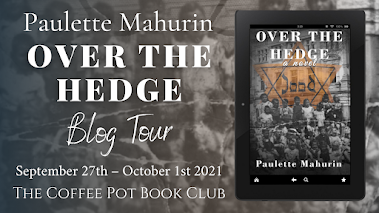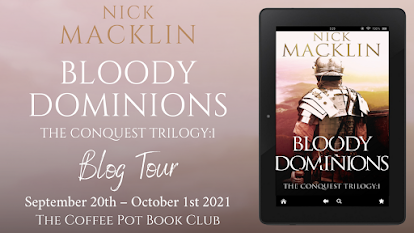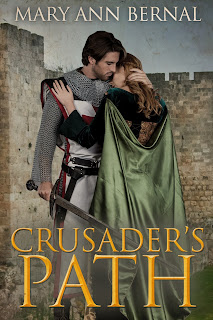Journey with those at the heart of the conflict as Caesar embarks on the
tumultuous conquest of Gaul 58-51 BC. Book One 58-56 BC.
As Caesar’s campaign begins, tests of courage and belief will
confront the three protagonists, shaping them as individuals and challenging
their views of the world and each other:
Atticus – an impetuous but naturally gifted soldier, whose
grandfather served with distinction in the legions;
Allerix – a Chieftain of the Aduatuci, who finds himself
fighting both for and against Caesar; and
Epona
– a fierce warrior and Allerixs’ adopted sister.
Experiencing the brutalities of conflict and the repercussions of both
victory and defeat, Atticus, Allerix, and Epona will cross paths repeatedly,
their destinies bound together across time, the vast and hostile territories of
Gaul and the barriers of fate that have defined them as enemies. In a twist of
fate, Atticus and Allerix discover that they share a bond, a secret that nobody
could ever foresee…
Trigger Warnings:
Violence, attempted rape.
Buy Links:
Universal Link
¸.•*´¨)✯
¸.•*¨) ✮ ( ¸.•´✶
Nick Macklin
Fun Facts
(Stuff you may or
may not already know!)
Tae Kwon Do
Although I have
long since given up my training, age catching up with my ability to move quite
as flexibly as I would like, I spent a number of years practicing Tae Kwon Do,
the Korean martial art, reaching Black Tag level. I actually started by
watching from the sidelines having taken my daughters along, but eventually
decided I may as well join in. There were times, often in the midst of a
particularly tough circuit training session that I questioned whether that was
a wise decision, but it was a great way to keep fit as well as learn a useful
self-defence technique. There are a lot of patterns and set moves to learn at
each level, which was a real test when your memory is not your strongest
point. Although the biggest test was
the gradings, formal assessments of whether you had captured the necessary
skills to progress to the next level. As someone who really doesn’t feel
comfortable being in the spotlight, having to run through things in public,
before an audience was a little daunting. I particularly remember my first
grading where for reasons unknown I ended up in the front row with a large
number of younger and very much smaller club members, I don’t think I have ever
felt more conspicuous, but everything turned out ok and challenging myself like
that was certainly character building. One aspect I did particularly enjoy was
the sparring, which often served as a cathartic release from the trials and
tribulations of a day in the office, working in the NHS can drive you to it!! I
actually ended up taking part in the South West Sparring Championships,
claiming a bronze medal. It was an exhilarating experience but nerve-wracking
too and gave me a very small taste of what it must have felt like to take your
place in the shield wall.
Hiking in Nepal
In October 2019 I
had the great privilege of spending ten days trekking the Himalayas in Nepal.
Inspired by the documentaries of David Attenborough and Michael Palin, I’d
always wanted to visit the Himalayas and waking up in the mornings beneath the
snow-capped peaks of Annapurna, and Dhaulagiri, I had to pinch myself that I
was actually there. The experience was even nicer for having my now grown-up
daughters as walking companions, we had a lot of fun and made some wonderful
memories. The trekking was tough, there isn’t a lot of flat terrain in the
mountains and I have to concede, as my girls will never let me forget, that
there were a few slips, trips, and falls along the way. The scenery however was
just amazing, the Nepalese warm and hospitable and the camaraderie of our
fellow walkers, who hailed from Australia and Canada, meant those evenings in
front of the campfires passed quickly and enjoyably, although 5.30am starts
meant there weren’t too many late nights!
One day we had
the option to take an optional hike to Khayer Lake at 4,660m above sea level
Everything started well enough and despite the altitude, we arrived at the lake
in good time. After a brief stop to admire the view, catch our breath, and pay
our respects at the Buddhist temple, we set off back to the lodge.
Unfortunately, as we retraced our steps, we got caught in an unseasonably early
snowstorm. Before too long, visibility was little more than a few yards, and
the safe track was lost amidst the rapidly accumulating snow. Wet, cold, and still
miles from the lodge, we trudged on for several hours with conditions steadily
worsening, especially as night began to fall. We can look back and laugh now
about having an adventure to tell but at the time it was a deeply unpleasant
experience and I won’t pretend that I wasn’t a little apprehensive at times,
especially when we stumbled, literally, into a herd of equally disgruntled
Yaks. I have never been so glad to see the lodge base and fully twelve hours after
we set off, get back in front of the fire. I was at least able to draw on the
experience when writing the early chapters of Book 2 in the Trilogy, Battle
Scars, where Atticus and his comrades in the XIIth find themselves in the
winter snow of the Alps, although they were battling a lot more than Yaks!
Baking
One of the things
that I have always enjoyed doing is baking, biscuits cookies, and cakes mainly,
although I have been known to turn my hand to the occasional bread product.
There really is nothing like the smell of a freshly baked cake and of course
you get to enjoy the fruits of your labour with a cup of tea and a good
book. I really can’t lay any claim to
producing anything to elaborate, although I did win first prize at the local village
show on a couple of occasions meaning I think, that I can lay claim to having
an award-winning Fruit Cake and a Banana Loaf. For the sake of
full disclosure and before the members of the local Women’s Institute take
legal action, I should add that this was in a men-only category but competition
was still fierce. Unfortunately, my attempts to secure a hat trick of successes
floundered with a chocolate roulade that looked like it had been carried,
carelessly, by Atticus on the march, so still plenty of work to do with that
one!
Sports Day Injury
In the dim and
distant past, when my daughters were both still in Primary school, I had the
afternoon off work one summer’s day to watch the school sports day. Intending
only to enjoy an ice cream alongside the supportive parent duties, I ended up
taking part in a father’s race, which had been organised to be a short dash
over a distance of c50-60 metres or so. By the time we were due to begin, I
think there must have been about fifteen to twenty of us on the start line. Those watching
later said that it was an accident waiting to happen as despite starting evenly
spaced, we all seemed to converge in the centre of the lanes as the race got
underway. Unfortunately, I was that accident! To this day I still claim to have
been tripped from behind and denied victory, but it was more likely a case of
my brain wanting to push faster than my legs could or would go, the end result
of which was crashing head over heels into the turf and climbing gingerly to
my feet with a double break to my wrist. As luck would have it, the local
doctor's surgery happened to be open that day and after a dose of morphine and a
quick trip to the A&E the wrist was reset. After further pain medication, I
watched the whole process with a degree of morbid fascination although how
coherent I was after the double dose of drugs is open to debate. I wore a cast
for the rest of the summer, which seriously impacted the planned holiday
reading but it was a useful reminder that my competitive athletic days were probably
behind me and the wrist healed well. Perhaps not surprisingly, the school
elected not to run a fathers' race the following year, not that I would have
been entering it!!
Taylor Swift
I was going to say
that a guilty secret of mine is a love of Taylor Swift’s music, given that I am
probably not her target demographic but I’m not guilty and it’s no longer a
secret. I’ve always loved music, including
musical theatre and film scores, and influenced by the music of my parents, the
soundtrack of my own life and latterly those of my daughters, I probably have
favourites records from every decade and almost every genre of music, including
more than a few of Taylor Swift’s. I was fortunate enough to see her in concert
in Manchester a couple of years ago, with my daughters. I went with some
trepidation, fearing that I might be a little on the old side but she has such
a broad appeal that I needn’t have worried. The show was fantastic and I’m
already looking forward to her next tour. My favourite song of hers at the
moment is ‘no body, no crime’ which has a storyline fit for a novel and
delivered in three and a half minutes!!
Nick Macklin
A history graduate, Nick enjoyed developing the skills
that would stand him in good stead during the extensive research he conducted
prior to writing his novel. Whilst the ancient world, unfortunately, didn’t
feature to any extent in his history degree, (the result of failing miserably
to secure the A level grades that would have permitted greater choice) he
maintained a lifelong and profound interest in ancient history and especially
the Roman Empire, continuing to read avidly as he embarked on a career in HR.
Over the next thirty years or so, Nick occupied a variety of Senior/Director roles,
most recently in the NHS. Unsurprisingly, writing in these roles was largely
confined to the prosaic demands of Board papers but Nick never lost the
long-harboured belief, motivated by the works of writers such as Robert Fabbri,
Robyn Young, Anthony Riches, Simon Scarrow, Matthew Harffy, and Giles Kristian,
that he too had a story to tell. When he was presented with a window of
opportunity three years ago, he took the decision to place his career on hold and
see if he could convert that belief into reality.
Nick always knew that he wanted to set the novel
against the backdrop of a significant event/period in Roman history. Looking to
narrow that down to something offering the potential for meaningful character
and plot development, but that hadn’t already received exhaustive coverage, he settled on Caesar's tumultuous
occupation of Gaul. Spanning eight years, the prolonged clash of cultures offered
ample opportunity for the kind of dual perspective from which he was hoping to
tell the story, whilst the violent conflict provided a wealth of exciting
material to explore the changing fortunes of war and its impact at a personal
level. The switching of allegiances, nations fighting for and against Rome also
provided the potential for some intriguing plot lines. As his research
unfolded, he was also struck by just how heavily the Roman psyche during this
period was influenced by the scare they had received fifty years earlier when
Germanic tribes invaded their territories and defeated their legions. Seeing
references to the veterans of that war watching their sons and grandsons enlist
for a similar campaign, he started to think about developing that link on both
sides of the conflict. And so, the idea for the Conquest Trilogy was born.
In Bloody Dominions Nick has sought to produce a novel
in which unfolding events are experienced and described from the perspective of
protagonists on both sides of Caesar’s incursion into Gaul. Conscious that the role of women in Roman
fiction, Boudica aside, is largely confined to spouse, prostitute, or slave,
Nick wanted to ensure that one of his lead characters was female and a
prominent member of the warrior clan of her tribe. The novel is driven by these
characters but the framework against which their stories unfold is historically
accurate, featuring actual participants in Caesar’s campaign and drawing on
real events as they occurred. As such Nick is genuinely excited about his
characters and the story they have to tell.
Nick lives in Exeter with his two daughters and is
currently juggling work as an Independent HR Consultant with writing the second
novel in the Conquest Trilogy, Battle Scars.
Social Media Links
Twitter Linked-in Goodreads BookBub








































